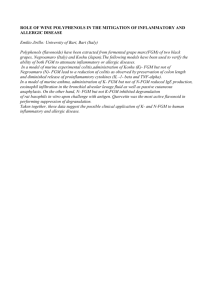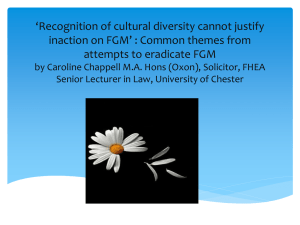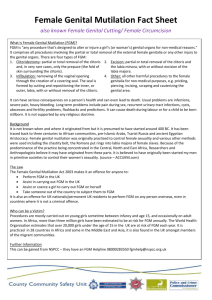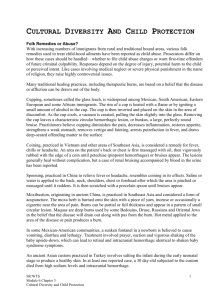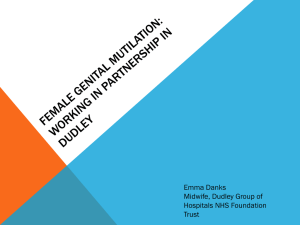local authority social services letter lassl(2004)4
advertisement
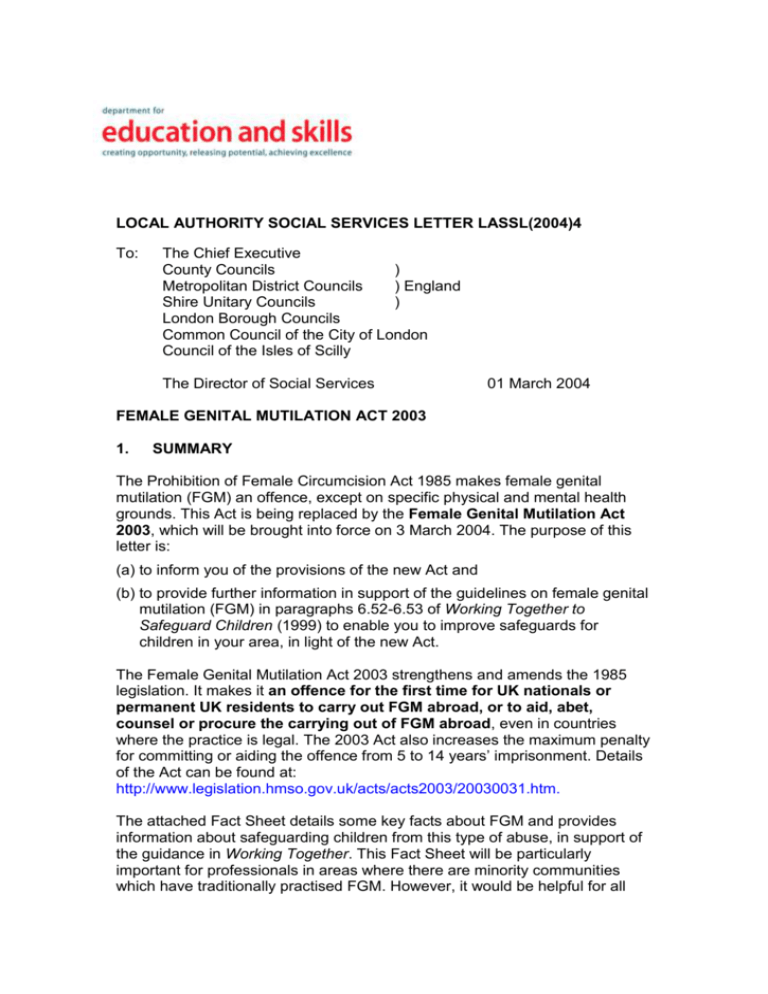
LOCAL AUTHORITY SOCIAL SERVICES LETTER LASSL(2004)4 To: The Chief Executive County Councils ) Metropolitan District Councils ) England Shire Unitary Councils ) London Borough Councils Common Council of the City of London Council of the Isles of Scilly The Director of Social Services 01 March 2004 FEMALE GENITAL MUTILATION ACT 2003 1. SUMMARY The Prohibition of Female Circumcision Act 1985 makes female genital mutilation (FGM) an offence, except on specific physical and mental health grounds. This Act is being replaced by the Female Genital Mutilation Act 2003, which will be brought into force on 3 March 2004. The purpose of this letter is: (a) to inform you of the provisions of the new Act and (b) to provide further information in support of the guidelines on female genital mutilation (FGM) in paragraphs 6.52-6.53 of Working Together to Safeguard Children (1999) to enable you to improve safeguards for children in your area, in light of the new Act. The Female Genital Mutilation Act 2003 strengthens and amends the 1985 legislation. It makes it an offence for the first time for UK nationals or permanent UK residents to carry out FGM abroad, or to aid, abet, counsel or procure the carrying out of FGM abroad, even in countries where the practice is legal. The 2003 Act also increases the maximum penalty for committing or aiding the offence from 5 to 14 years’ imprisonment. Details of the Act can be found at: http://www.legislation.hmso.gov.uk/acts/acts2003/20030031.htm. The attached Fact Sheet details some key facts about FGM and provides information about safeguarding children from this type of abuse, in support of the guidance in Working Together. This Fact Sheet will be particularly important for professionals in areas where there are minority communities which have traditionally practised FGM. However, it would be helpful for all social services staff to have access to the Fact Sheet, so that they can be ready to support children who have suffered or are at risk of suffering harm as a result of FGM. 2. ACTION Authorities are asked to take the following action: Note the provisions of the Female Genital Mutilation Act 2003, and in particular that it is now illegal to take girls abroad for this procedure. Circulate the enclosed Fact Sheet to all social services staff. In areas where there are large numbers of people from communities that traditionally practise FGM, consider, in partnership with other interested agencies: - what preventive action might need to be taken to safeguard children from this type of abuse. - whether more detailed guidance on responding to concerns about FGM should be incorporated into their existing child protection procedures. 3. ENQUIRIES In the first instance, enquiries about this Circular should be made to Amy Buxton at the Children’s Safeguards Unit, in the Department for Education and Skills. Tel. 0207 972 4885 Fax. 0207 972 4627 Email. amy.buxton@doh.gsi.gov.uk or amy.buxton@dfes.gsi.gov.uk From: Children’s Safeguards Unit, Department for Education and Skills, Wellington House, 133-155 Waterloo Road SE1 8UG. FEMALE GENITAL MUTILATION (FGM) - THE FACTS What is FGM? FGM is a collective term for procedures which include the partial or total removal of the external female genital organs for cultural or other nontherapeutic reasons. What are the effects of FGM? FGM is very harmful. It is not like male circumcision. It causes long-term mental and physical suffering, difficulty in giving birth, infertility and even death. What does the law say about FGM? FGM has been specifically illegal in the UK since the Prohibition of Female Circumcision Act 1985, but it has been possible to get round the law by having the procedure done out of the country. The Female Genital Mutilation Act 2003, which comes into force on 3 March 2004, amends and strengthens the 1985 Act. It explicitly makes it illegal to take girls abroad for FGM and increases the maximum penalty for committing or aiding the offence to 14 years. Who is affected by FGM? FGM is typically performed on girls aged between 4 and 13, although in some cases it is performed on new born babies or young women prior to marriage or pregnancy. How can you tell if FGM is an issue in your area? FGM is much more common than most people realise. It is estimated that there are around 74,000 women in the UK who have undergone the procedure, and about 7,000 girls under 16 who are at risk. This estimate is based on the number of women and girls living in the UK who originate from countries where FGM is traditionally practised, such as Yemen, Oman, Malaysia, Indonesia and the United Arab Emirates as well as 26 countries in Africa from Gambia to Somalia. There are substantial populations from these countries in the big cities like London, Liverpool, Birmingham, Sheffield and Cardiff, but FGM is not necessarily confined to these areas. It is important that you ascertain how many girls might be at risk of harm as a result of FGM in your area. Community groups may be able to help with this task. SAFEGUARDING CHILDREN FROM FGM Preventive strategies Working Together to Safeguard Children (1999) says that in local areas where there are communities or individuals who traditionally practice FGM, the ACPC’s policy should focus on a preventive strategy involving community education. FGM is deeply embedded in the culture of the practising community who may resent what they perceive as the imposition of liberal western values on them, but it is not a matter which can be left to personal preference or culture and custom. FGM is an extremely harmful practice that violates the most basic human rights. However, any community education should be sensitive to the cultural norms and pressures on parents and children. It may be most useful to try to engage community groups and elders or religious leaders in community education programmes. It is extremely important that those running programmes are not seen as alien to the practice. This may create animosity and paranoia within the practising communities and make it harder to safeguard children from FGM. Organisations who can provide more information about community education programmes include: Agency for Culture and Change Management 11a Arundel Gate, Sheffield, S1 2PN. Tel 0114 275 0193 Email: smcculloch@accmshefield.fsnet.co.uk Foundation for Women’s Health, Research and Development (FORWARD) Unit 4, 465 – 467 Harrow Road, London, NW10 5NY. Tel: 020 8960 4000 Email: forward@forwarduk.org.uk Black Women’s Health and Family Support 82 Russia Lane, London, E2 9LU. Tel: 020 890 3503 Email: bwhfs@btconnect.com Research, Action and Information Network for the Bodily Integrity of Women (RAINB♀) Suite 5a, Queens Studios 121 Salisbury Road, London NW6 6RG. Tel: 020 7625 3400 Email: info@rainbo.org Another equally important part of community education is ensuring that all local agencies that come into contact with children are aware of the need to safeguard girls from FGM, and have the knowledge, training and support to do this. Information on the signs which indicate that a girl may have suffered FGM can be obtained from the above organisations. Responding to the needs of a particular child FGM can cause serious harm and suffering. Working Together To Safeguard Children (1999) highlights that a local authority may exercise its powers under s.47 of the Children Act 1989 if it has reason to believe that a girl is likely to be or has been the subject of FGM. It is important to note that FGM differs from other forms of child abuse in two important ways: 1) despite the severe consequences, parents and others who have done this to their daughters genuinely believe it is in the girl’s best interest to conform with their prevailing custom – they do not intend it as an act of abuse 2) there is no element of repetition – it is a one-off act of abuse – although younger female siblings may be at risk Where a family has been identified as at risk, it may not be appropriate to take steps to remove the girl from an otherwise loving family environment. Experience has shown that often the parents themselves are under pressure to agree to FGM for their daughters from older relatives. It might be helpful, therefore, to talk to the family outside the home environment to encourage them to acknowledge the impact FGM would have on their daughter/s. It might also be necessary to ask the police to get a prohibited steps order, making it clear to the family that they will be breaking the law if they arrange for any of their daughters to have the procedure. In areas where there are large practising communities, social services departments should consider incorporating more detailed guidance on responding to concerns about FGM to their existing child protection procedures, in partnership with other local agencies and community groups.
